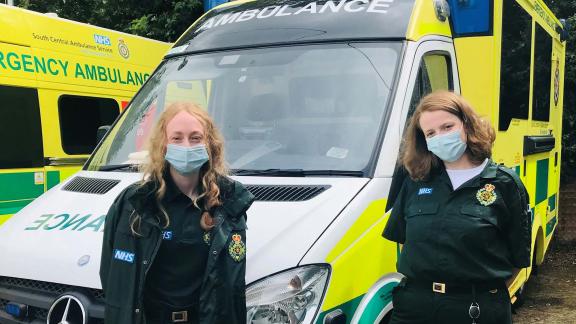Recruiting young people into the ambulance service

Overview
By partnering with The Prince’s Trust and designing tailor-made pre-employment programmes, South Central Ambulance Service NHS Foundation Trust (SCAS) has equipped young people with the knowledge and confidence needed to gain a job within their organisation.
Key benefits and outcomes
- Developed a tailor-made, pre-employment programme which teaches young people about the values and attributes needed for working at the trust and prepares them for interviews.
- A reduction of myths regarding qualifications needed to work in the ambulance service.
- Production of a career progression map to show the minimum requirements for each role in SCAS and expanding the job pool to include NHS 111 health advisor and emergency call taker
- 40 per cent of the young people who completed the three-day programme progressed to a substantive role.
- 91 per cent of young people who were offered a substantive role have remained in post.
What the organisation faced
Through feedback, SCAS discovered that many of its local young people misunderstood the roles and qualifications needed to work in the ambulance service.
The trust found there was an increased public interest in working in the ambulance service, due to reality television programmes and the media coverage of the pandemic, but also observed that young people rarely got in touch after career promotional events at local colleges.
What the organisation did
The trust’s digital recruitment advisor heard about The Prince’s Trust at an NHS Employers webinar in September 2020. An initial meeting was set up between SCAS and The Prince’s Trust to discuss how they could work together to build on the public interest for roles.
It was recognised that Prince’s Trust pre-employment programmes could help provide a supported career pathway for interested young people, based on teachable skills as well as qualifications such as GCSEs.
The following actions were taken.
- To gain leadership buy-in, a partnership proposal was presented to the Executive Director Board. The board readily agreed to support the recruitment team to partner The Prince’s Trust.
- Recruitment and education teams dedicated time to review each element of the existing recruitment process, reviewing key areas discussed at interviews.
- They asked themselves questions, such as ‘what do we want young people to understand before they get to interview stage?’
- They adapted the programme to ensure that its content supported elements of the interview such as equality and diversity.
- For candidates who were unsuccessful at interview and aged between 18-30 years old, they provided a personalised rejection response and encouraged them to attend its Prince’s Trust programme.
- They considered the time of day that young people were most likely to view social media items about recruitment and concentrated social media promotion about recruitment for those times, mainly in the evenings. - Feedback from young people in other training programmes showed that they valued visual tools such as videos and small group discussions to engage with the content. SCAS used educational YouTube videos to engage young people and a new film was made internally by the education department to show what good and bad patient care looks like.
- It was agreed if a young person who attended the programme, met the minimum requirements on their CV, they would be guaranteed a job interview for that role.
- SCAS also holds live chats online which are dedicated to promoting a specific role within the organisation. Each chat includes a 30-minute presentation about the role and minimum requirements, followed by a 30 minute live question and answer session. These are promoted via Facebook, Instagram, Twitter, and LinkedIn.
The first Get Started pre-employment programme was delivered by The Prince’s Trust in April 2021 to seven young people at the trust. The three-day programme teaches young people about the values and attributes needed for the work and prepares them for interviews.
SCAS has since expanded the programme to offer recruitment into the following roles: apprentice emergency care assistant, emergency care assistant, ambulance care assistant, NHS 111 health advisor and emergency call taker. The trust has now enrolled 66 young people onto the programme.
Results and benefits
SCAS has seen the quality and confidence of candidates for roles increase since beginning Get Started. Jobs were offered to all seven young people who completed the first programme in April 2021 and candidates scored extremely well in interviews.
The trust has gone on to offer a further 18 young people a substantive role. The current retention rate of those who started employment is 91 per cent. SCAS aims for successful candidates to proceed directly into training and induction courses and to progress from job offer to job start within eight to 12 weeks.
The SCAS Get Started programme is repeated every three months, with eight programmes completed so far. The trust introduced two new call centre pre-employment programmes in June 2022.
SCAS has highlighted the many benefits of working with The Prince’s Trust, including:
• a shared passion for recruiting young people
• exceptionally good communication
• providing a flexible approach to make it work for the individual trust
• reaching a wide audience with its extensive networks of contacts
• providing financial support to help young people achieve their C1 driving licence.
“The Prince’s Trust team listened to our needs. They were keen to learn about SCAS and our specific requirements for new staff. We are now excited to be forming a new programme exploring where The Prince's Trust could help us within our own call centres across Bicester, Otterbourne and Milton Keynes."
- Laura Farrow, Senior Recruitment Advisor, SCAS.
Overcoming obstacles
Some candidates reported that they didn’t previously think it would be possible to apply directly to SCAS. However, The Prince's Trust was able to reach out within its networks to promote the opportunities with SCAS.
One obstacle was the requirement for the C1 element on applicant's driving licences, which can cost up to £1,000. The Prince's Trust was able to support candidates who had been successful at interview with funding to cover this element. This was a great incentive and helped these young people overcome a significant barrier.
The trust also encountered delays with candidates receiving the C1 entitlement due to COVID-19 restrictions during the pandemic. C1 tests were reduced at the time and a back-log of applications to the DVLA for all driving licences mounted.
Candidates were also required to complete a medical examination before obtaining a provisional C1 which could only be provided by a GP or private provider. The Prince’s Trust helped SCAS overcome these additional pressures by undertaking their own tendering process so they could nominate providers themselves.
Expanding the pool of roles to include NHS 111 health advisor and emergency call taker has helped overcome the barrier of needing a C1 licence completely. The time taken for candidates to start these roles after job offer is much reduced, although candidates are required to pass a typing and listening assessment.
“Our Prince’s Trust partnership is an excellent way to educate young people in pre-hospital emergency care. Delivering this programme virtually provides a safe space for these individuals which inspires them to go further, get better and gain the confidence they need to grow.
No longer are we looking to fill jobs, but start careers.”
- Ian Teague, Assistant Director of Education, SCAS.
Top tips
- Start conversations with The Prince’s Trust a while before the first programme and prepare to change the content and format to suit your trust.
- Start by recruiting into key roles but expect this to be slow and steady to begin with.
- Commit time, or even a dedicated team, to follow young people on their journey into their roles.
- Make sure you understand what The Prince’s Trust can do for you. Hold monthly meetings with The Prince’s Trust team to keep in contact, reflect on progress and make plans.
- Work out your endgoal and work backwards. Look at the interview questions and ask what preparation and training young people need to meet the criteria. Adapt the programme content to meet your requirements.
Further information
For more information about the work in this case study, contact Michelle Ducie, recruitment advisor, South Central Ambulance Service NHS Foundation Trust, at Michelle.Ducie@scas.nhs.uk.



